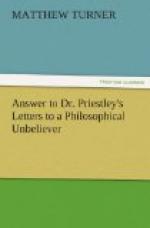That mischief may ensue to society by such freedom of discussion is also another argument for me to consider; I do not say to combat, for though I were convinced or could not resist the argument that mischief would ensue to society by such a discussion, yet I should think myself intitled to enter into it. I have a right to truth, and to publish truth, let society suffer or not suffer by it. That society which suffers by truth should be otherwise constituted; and as I cannot well think that truth will hurt any society rightly constituted, so I should rather be inclined to doubt the force of the argument in case atheism being found to be truth should apparently be proved prejudicial to such a society.
I come unprejudiced to the question, and when I have promised you an answer to your future Letters in support of revelation, I have neither anticipated your argument nor prejudged the cause. I hold myself open to be convinced, and if I am convinced I shall say so, which is equally answering as if I denied the force of your observations. In that sense only I promise an answer. If I believe I shall say, I do; but I shall not believe and tremble, confident as I am, that if I act an honest part in life, whether there be a Deity and a future existence or not, whatever reason I may have to rejoice in case such ideas he realised, I can upon such an issue have none to tremble. I look upon myself to have more reason to be temporally afraid than eternally so. Dr. Priestley or any




